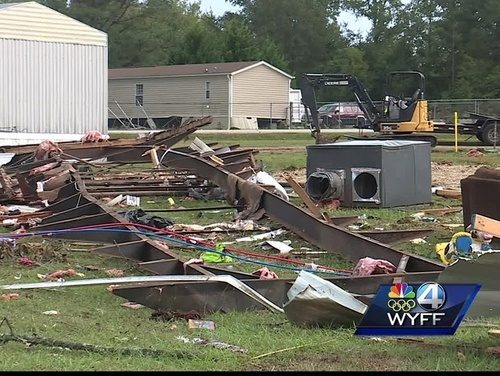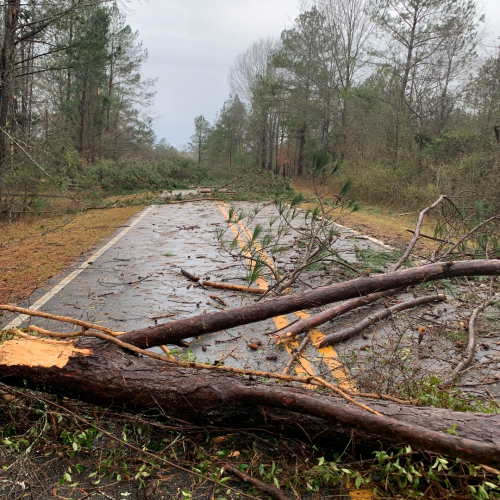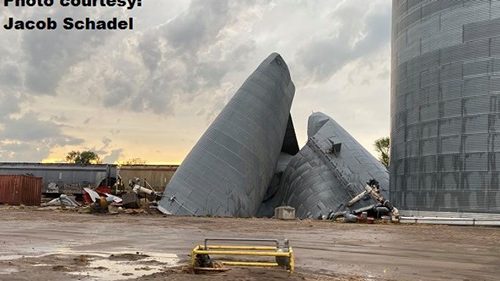Nine months after a tornado ripped through tiny Naplate, Ill., smashing houses to rubble in a few terrifying seconds, the town’s stuttering recovery was summed up one recent morning by the happenings on 19th Avenue.
On one side of the street, Nick Brandt watched as a crane carefully lowered the two halves of his factory-built ranch house onto a foundation, replacing the home that had been wrecked in the storm. If all went according to plan, he said, he’ll be able to move in next month.
On the other side, Roger Dettore maneuvered a Bobcat through debris torn from his pulverized but still erect family home. He said he hoped to replace the century-old structure with a multi-unit property, but that day appeared far away.
So it goes throughout the village of 400 people — fresh construction here, a roofless shell there. Yellow-sided new homes sprout like dandelions on a once-ravaged parcel, while a barren foundation next door reveals what has yet to be replaced.
But as Thanksgiving approached, Naplate residents were focused on the positive. Though a falling tree killed two men in neighboring Ottawa, no one in the village died in the tornado, even as some had their walls torn down around them.
Eighteen buildings were destroyed and dozens more damaged, but most of Naplate’s businesses reopened. A glass factory on the outskirts of town is just about to resume operation.
And according to Mayor Jim Rick, only a few families left in the storm’s aftermath. The rest have stuck around and, despite scant government aid and sometimes recalcitrant insurance companies, are helping Naplate mend.
“It’s devastating when something like this happens, but it’s also rewarding to see the people come back and rebuild and move forward — and that’s what we’re doing,” Rick said.
11-mile rampage
Naplate gets its name from the National Plate Glass Co., former owner of the mammoth factory just beyond the village limits. The town was founded in the early 20th century to provide housing to workers at the glass company and a nearby sand mine, Rick said, but over time has become more of a bedroom community to Ottawa.
While some, including Rick, are lifelong residents, others are recent transplants drawn by small-town life.
Jared Wheeler moved to the village from Ottawa last year, living in an apartment attached to a thrift shop. He said he enjoys Naplate’s small size, leisurely pace and abiding quiet.
But at 4:40 p.m. Feb. 28, that quiet ended when a large storm system turned violent, pelting the area with hail the size of baseballs and giving birth to a string of tornadoes.
The one that touched down in Naplate began its 11-mile rampage west of town, where its 155-mph winds demolished the LaSalle County Highway Department building and badly damaged a county nursing home whose residents had been ushered into windowless hallways.
The twister then slashed through Naplate on its way to Ottawa, razing buildings as residents cowered in the most secure places they could find.
“I saw over in that direction a big wall cloud-looking thing,” Wheeler said. “I heard the high-pitched whistling, so I went in the bathroom and hid in the tub. It kind of sounded like a freight train hitting the house. It was over in a couple of seconds.”
His apartment lost some of its roofing, siding and windows, but that was minor compared to the damage only a few hundred feet away.
Chaos, then delays
Mike McGrath and his wife were in their home on 19th Avenue when the tornado blew out their windows and sent a huge tree crashing through their roof. Though McGrath and his wife were unhurt, surviving the tornado turned out to be the easy part.
He said his insurance company dithered over whether to demolish the structure or save it, leaving the roof without a tarp. Rain ruined the interior, driving up the cost when the company finally decided to rebuild, he said.
Then there was a long wait to find a contractor — a common complaint in the village. New windows just went in this week, McGrath said, and he and his wife probably won’t be able to move back until February at the earliest.
“You’re glad everyone made it and that no one was seriously hurt,” McGrath said. “But on the other hand, you think: ‘You’re retired. You should be relaxing instead of worrying.’”
McGrath’s street was so devastated that Gov. Bruce Rauner gave a media briefing there the day after the tornado, speaking to a bank of TV cameras as power lines dangled in the background.
“This could have been much, much worse,” he said. “Now we want to make sure that we help the community recover quickly. We’re going to have the state resources here to help with the cleanup.”
Rick, though, said that assistance didn’t amount to much — the labor of eight prison inmates for six hours and the use of four dump trucks for two days. The village was left with its own expenses, he said, including a $20,000 landfill bill and a $9,000 bill for fueling vehicles from other towns that offered assistance.
“The politicians came for the photo op, and that was it,” he said. “They were no help at all.”
Patti Thompson, spokeswoman for the Illinois Emergency Management Agency, said disaster relief didn’t come because statewide damage to public property and government expenses added up to only about $2 million. The minimum amount needed to trigger federal aid is $18 million, she said.
“It’s just very, very hard to reach that federal threshold when you have a small number of communities that are impacted,” she said.
Slow rebuild
Rebuilding thus became a house by house, block by block endeavor, and not just for homeowners. The glass company, now owned by Pilkington North America, was heavily damaged and had to shut down. Storm-battered St. Mary Catholic Church also closed.
Pilkington replaced the factory’s roof and some of its walls and equipment, and will resume production next month, a spokeswoman said. The LaSalle County Nursing Home underwent major repairs and brought back its residents in mid-September, according to an administrator.
The church was too damaged to reopen and will be torn down, though plans call for a grotto to be built on the site, Rick said. The Peoria Diocese did not return messages seeking comment.
Most of the town’s few restaurants and bars were out of the tornado’s path; they endured only minor damage and reopened quickly.
“It’s been pretty steady,” said Brian Battistelli, manager of the Bears Den restaurant. “I wouldn’t say it affected us either way.”
Village Trustee Lloyd Ludwig said one heartening thing about the tornado’s aftermath was how it spurred generosity. A not-for-profit paid for 37 trees to replace some of those that had been uprooted, nearby businesses held fundraisers and residents performed untold kindnesses for one another, he said.
“We have a lot to be thankful for,” he said. “Neighbors reached out to help neighbors. Even during the cleanup, a couple guys on their days off drove around and saw people working — they’d hop out and help them. Just as a community, it’s been really good.”
by John Keilman
November 25, 2017




